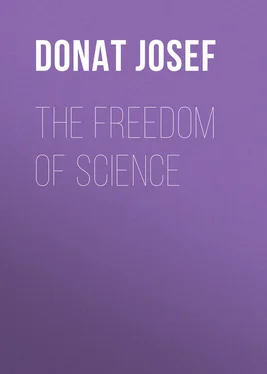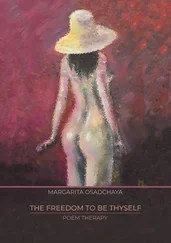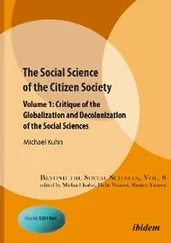Josef Donat - The Freedom of Science
Здесь есть возможность читать онлайн «Josef Donat - The Freedom of Science» — ознакомительный отрывок электронной книги совершенно бесплатно, а после прочтения отрывка купить полную версию. В некоторых случаях можно слушать аудио, скачать через торрент в формате fb2 и присутствует краткое содержание. Жанр: foreign_antique, foreign_prose, на английском языке. Описание произведения, (предисловие) а так же отзывы посетителей доступны на портале библиотеки ЛибКат.
- Название:The Freedom of Science
- Автор:
- Жанр:
- Год:неизвестен
- ISBN:нет данных
- Рейтинг книги:4 / 5. Голосов: 1
-
Избранное:Добавить в избранное
- Отзывы:
-
Ваша оценка:
- 80
- 1
- 2
- 3
- 4
- 5
The Freedom of Science: краткое содержание, описание и аннотация
Предлагаем к чтению аннотацию, описание, краткое содержание или предисловие (зависит от того, что написал сам автор книги «The Freedom of Science»). Если вы не нашли необходимую информацию о книге — напишите в комментариях, мы постараемся отыскать её.
The Freedom of Science — читать онлайн ознакомительный отрывок
Ниже представлен текст книги, разбитый по страницам. Система сохранения места последней прочитанной страницы, позволяет с удобством читать онлайн бесплатно книгу «The Freedom of Science», без необходимости каждый раз заново искать на чём Вы остановились. Поставьте закладку, и сможете в любой момент перейти на страницу, на которой закончили чтение.
Интервал:
Закладка:
The bud bursts forth and freely unfolds its splendour; the butterfly grows unhindered in beauty; the tree, too, wants freedom, in order to develop its boughs and branches according to its nature, and if you try to bind and tie it, it resists as much as it can. Just so is freedom needful for the development of the noblest aspirations of human nature, for its progress in knowledge. Every friend of humanity, every one who loves his own kind, must be in sympathy with its progress. Who will not rejoice to see the mind of man happily trace the laws of nature, laid down by the Spirit of God in the stillness of eternity when as yet there was no creature to heed, the laws He then placed in nature in order that the reasonable creature might discern the marks of his Creator? Who would not rejoice to see man, diligently following the facts of history and studying the works of literature and art, find therein the ideas of God reflected, as the rays of the sun in the trembling drop of dew, and, finally, trying to solve the difficult problems of life? To this end has the Creator enkindled in the mind of man a spark of His own intelligence; to this end has He put in him a desire to inquire and learn, a desire which has exerted itself most in the noblest of men. Man is destined to find his ultimate gratification in beholding the Eternal Truth and Beauty, a vision which will be the completion of human science and culture, the highest perfection of created life. Thus man's noble desire for knowledge and truth must develop, it must be able to produce leaves and blossoms. For this he needs freedom, free air, and free light.
If science is to attain its high purpose, it must have freedom also to impart the knowledge acquired. It should indeed further the progress of mankind. By its discovery it should enhance the beauty of human life, should enrich the treasure of human knowledge, should promote education and morality, to the honour of the Creator. For this end, too, freedom is necessary: freedom to impart newly acquired knowledge, else there would be no pleasure in work, stagnation rather than progress.
Chapter II. Two Views Of The World And Their Freedom
There can, then, be no difference of opinion on this matter among sober-minded men: science must be free from all unjust hindrances and restraint. But we have not yet finished. We have not even proceeded very far on our way. The further question at once presents itself: Which are those unjust hindrances and restraints that scientific research and teaching may reject? May there not perhaps be such which it must respect? There is little meaning in the cry: Freedom! Freedom! This attractive word, which always finds an enthusiastic echo in man, may easily prove a misleading catchword, and become a dangerous weapon of the thoughtless and the unscrupulous.
The question is not, whether our science, or, to speak more generally, our intellectual life, must be free – of that there can be no doubt. No life can spring up and thrive without due freedom. The question is: What sort of freedom? how can it be more precisely defined? We all, indeed, demand freedom for the citizen; but what kind of freedom? He should be free from the fetters of tyranny and despotism. Do we also demand that he be free from the laws of the state? By no means! On the contrary, he must be subject to these, for the very reason that he is a citizen and not the inhabitant of an uncivilized world. We demand freedom for the artist; he should not be bound by the tyranny of fashion. Do we also demand that he be exempt from the laws of beauty and art? Not at all. He must subject himself to these if he means to be an artist and not a quack. That would not be true freedom, but lawlessness and license, the privilege of barbarism. Freedom therefore is a very ambiguous word.
There are two kinds of freedom , lawful and unlawful : the latter is freedom from just laws, the former from unjust laws.
We ask again, what is that lawful freedom which man may claim for his scientific activity? In other words, what are the restraints which he may reject as unjust, and as enslaving the mind? – Here the ways part. Here, too, our question goes deeper, and touches something which moves men's minds very powerfully. Two different views of the world, two opposite conceptions of man and his thought, come here in collision.
The Christian View of the World and its Freedom
On the one hand there is the Christian view of the world: it is essentially also the one which appears self-evident to every unbiassed mind. In this view man is a creature, limited in every way, therefore in many ways dependent upon external rules, forces, and authorities. To God alone is it reserved to be infinite, and, therefore, to possess in Himself all perfection, goodness, and truth; for which reason there is nothing above Him on which He could be dependent. This is not the case with man. As a creature man is subject to his Creator. The latter is master over man's life and therefore at the same time its ultimate aim. For this reason religion is of obligation to man, that is, he must honour God as He demands it; if God requires faith in a revelation, if He established a Church and duly authorized it to guide us, we must submit to it. In the same way the intellect of man is bound by the laws of objective truth, which is not of his making, but presents itself to him as a norm: he must always be subject to it whether he wishes or not. Man is, finally, a factor in social life; he lives in the family, state, and Church, in the great society of mankind; upon them he is dependent for his education and development. And society requires that man be subject to a ruling authority, that in many things his own interests be subordinated to the welfare of the community.
This is the order that God has established and wishes observed. Hence all human authority is a participation in God's supreme government. Thus it comes about that limits may be set to the scientist's free expression of his views, if the interest of the community require it.
Man is, nevertheless, free. But his freedom does not mean complete independence; nor freedom from all restraint, but only from those external restraints which are opposed to his nature and position, which hinder his legitimate development and activity. He possesses freedom, but only such a freedom as is his due, by which he can unfold and develop his physical and mental powers. To keep his place of subordination to, and dependence on, these higher authorities and powers of truth and order, tends not to injure but to improve his being, not to dwarf but to develop his personality; for they are sources of life to him, they impart to his existence order and harmony, they raise him above himself and his own littleness, they free him from the prison of his own narrowness and selfishness, from the chains of his unruly desires. If a man emancipates himself from these bonds, which he ought to bear, he has freedom of course, but an unnatural freedom, which will be harmful and perhaps ruinous to him.
Take the tree, for instance. It should have freedom for its natural growth. If you force it to creep along the ground instead of growing upward, if you deny it air and light, you infringe on the freedom it should have. Still it cannot have absolute freedom, for it is dependent on the ground from which it derives its nourishment, dependent on the laws of light and atmosphere and gravitation, on the laws of season; it must adapt itself to climate and soil. It may not say to the light: Away with you! – a stunted growth and deformity would be the result of such emancipation. It may not say to the ground: Away with you! – a sad but quick death would be its fate. It has its freedom, and in this freedom it grows and thrives. If it desires greater freedom, it would be an unnatural one, and it would tend, not to its development, but to its destruction.
Читать дальшеИнтервал:
Закладка:
Похожие книги на «The Freedom of Science»
Представляем Вашему вниманию похожие книги на «The Freedom of Science» списком для выбора. Мы отобрали схожую по названию и смыслу литературу в надежде предоставить читателям больше вариантов отыскать новые, интересные, ещё непрочитанные произведения.
Обсуждение, отзывы о книге «The Freedom of Science» и просто собственные мнения читателей. Оставьте ваши комментарии, напишите, что Вы думаете о произведении, его смысле или главных героях. Укажите что конкретно понравилось, а что нет, и почему Вы так считаете.












